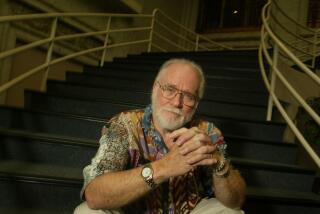PASSINGS: Vincent G. Dowling, John La Montaine
Vincent G. Dowling
Actor, director gave Tom Hanks early break
Actor and director Vincent G. Dowling, 83, who left behind a long career with Ireland’s national theater to run a Shakespeare festival in Cleveland where he gave a young Tom Hanks an early break as an actor, died May 10 at a Boston hospital. The cause was complications from surgery, said his wife, Olwen.
At 16, Dowling left school in his native Dublin to become an actor and in 1953 joined the Abbey Theatre, Ireland’s national theater company. He had long been its artistic director when he left in 1976 to take the same position with the Great Lakes Shakespeare Festival in Cleveland.
He stayed in Cleveland until 1984, helping the festival achieve national prominence.
Dowling was a visiting professor at Cal State Sacramento when he directed Hanks, then a drama student at the school, in a play. Dowling brought Hanks to the Shakespeare festival as an intern in 1977, and the actor achieved local stardom onstage in “Two Gentleman of Verona” the next year.
“Vincent’s the reason I’m an actor, man,” Hanks said decades later, according to the Cleveland Plain Dealer. “To act with Vincent on the stage is to share the wings with a master.”
In the 1980s, Dowling served as artistic director of the Solvang Theaterfest and of the Pacific Conservatory of Performing Arts in Santa Maria. He eventually settled in Chester, Mass., where he established a professional theater in 1990.
On three state occasions, Dowling performed at the Reagan White House.
The son of a sea captain, he was born Sept. 7, 1929, the sixth of seven children. He made his unofficial stage debut at age 6, when his older siblings insisted he join them in a production.
John La Montaine
Composer won Pulitzer Prize for music in 1959
John La Montaine, 93, an American composer who won the Pulitzer Prize for music in 1959 for his Piano Concerto No. 1, died April 29 at his home in Los Angeles, according to his nephew Peter Coster. He had Alzheimer’s disease.
La Montaine composed in a lyrical, tonal idiom that drew on such diverse elements as folk song, jazz and natural sounds. Besides the Pulitzer-winning piano concerto, he drew accolades for “Overture: From Sea to Shining Sea,” orchestral music written for President Kennedy’s inauguration in 1961.
Born in Chicago on March 17, 1920, La Montaine began composing music as a teenager. He graduated from the Eastman School of Music in Rochester, N.Y., in 1942, served in the Naval Reserve and continued his studies at the Juilliard School in New York and the Fontainebleu in France. From 1950 to 1954, he played piano in the NBC Symphony under Arturo Toscanini.
In the late ‘50s he decided to write music full time and supported himself with grants and fellowships, including awards from the Guggenheim, Ford and Rockefeller foundations. In 1977 he lectured at Whittier College while holding the school’s Richard M. Nixon chair.
-- Los Angeles Times staff and wire reports
More to Read
Start your day right
Sign up for Essential California for the L.A. Times biggest news, features and recommendations in your inbox six days a week.
You may occasionally receive promotional content from the Los Angeles Times.






